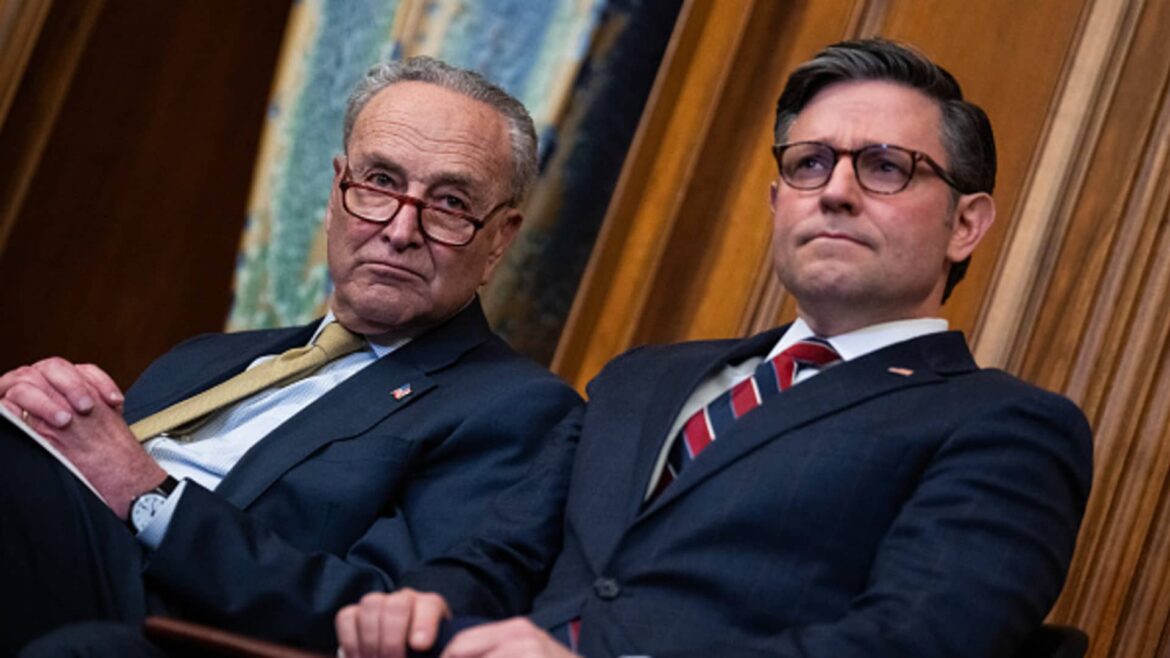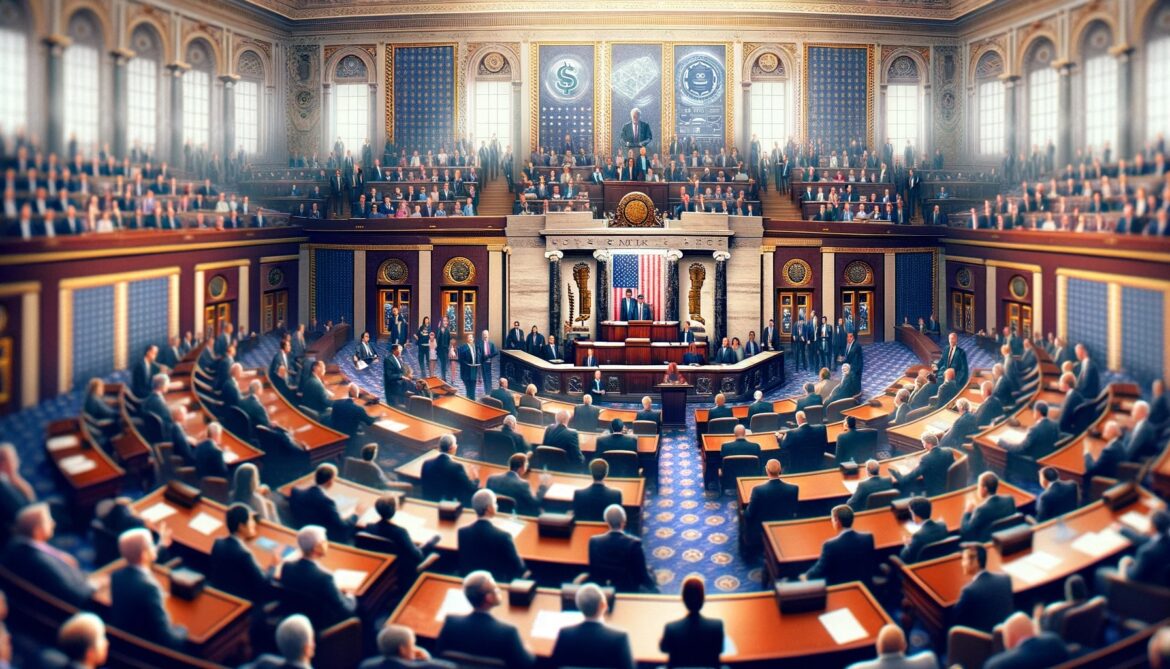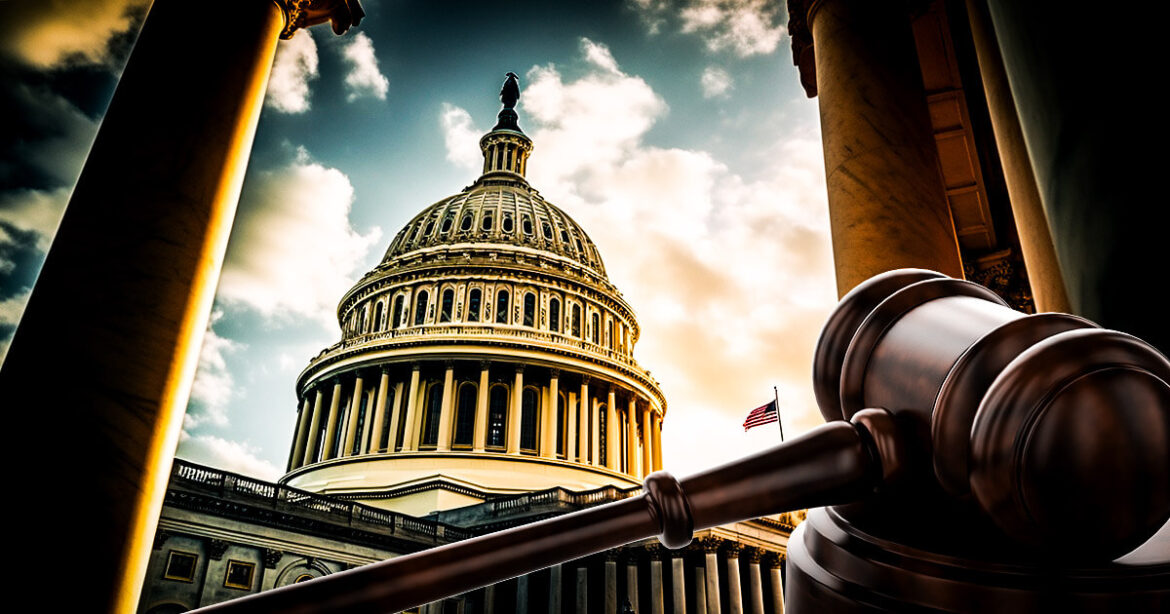
Retroactive removal of deduction limits is a giveaway to corporations.
Source link
Congress
Congress unveils first six budget bills to avert government shutdown
Senate Majority Leader Charles Schumer, D-N.Y., left, and Speaker of the House Mike Johnson, R-La., attend a Menorah lighting to celebrate the eight-day festival of Hanukkah, in the U.S. Capitol on Tuesday, December 12, 2023.
Tom Williams | Cq-roll Call, Inc. | Getty Images
Congressional lawmakers on Sunday released the details of the first six budget bills needed to keep government agencies funded before they run out of money and a partial government shutdown takes effect this coming weekend.
The 1,050-page appropriations package has funding for six major areas of government that encompass military and veterans affairs departments, agriculture, commerce, energy and water, transportation, housing, and more.
Funding for those departments was due to expire last Friday, March 1, but congressional leaders struck a deal on Wednesday to extend those deadlines by a week and avert a partial government shutdown. It was the fourth such funding extension this fiscal year, as Congress has struggled to settle on a long-term budget plan.
This partial budget deal is a step forward in the push to secure a permanent budget plan for the rest of the fiscal year, which started Oct. 1.
But these six funding bills are just half the battle.
The other six appropriations bills that keep the rest of the government funded are due to expire March 22, giving Capitol Hill just over two weeks to negotiate the other half of the government’s spending plan.
Read more CNBC politics coverage
Still, leaders on both sides of the aisle are touting the first half of funding package as a win, though for different reasons.
Democrats are trumpeting the continued full funding of a special food assistance program for women, infants and children. They also secured wins on rent assistance and pay for infrastructure employees like air traffic controllers and railway inspectors.
“Throughout the negotiations, Democrats fought hard to protect against cuts to housing and nutrition programs, and keep out harmful provisions that would further restrict access to women’s health, or roll back the progress we’ve made to fight climate change,” Senate Majority Leader Chuck Schumer, D-N.Y., said in a Sunday statement.
Meanwhile, Republicans are trumpeting victories on veterans’ gun ownership and funding cuts to government agencies like the Environmental Protection Agency, the FBI and the Bureau of Alcohol, Tobacco, Firearms and Explosives.
“House Republicans secured key conservative policy victories, rejected left-wing proposals, and imposed sharp cuts to agencies and programs critical to President Biden’s agenda,” House Speaker Mike Johnson, R-La., said in a statement Sunday.
The funding package now heads to the House for a vote where it will likely face opposition from the House Freedom Caucus, a coalition of Republican hard-liners who have relentlessly opposed budget compromises over the past fiscal year.
“The clock is now ticking until government funding runs out this Friday. Between now and the end of the week, the House must quickly pass and send the Senate this bipartisan package,” Schumer said Sunday. “Once again, it will only be bipartisanship that gets us across the finish line.”
Don’t miss these stories from CNBC PRO:
US Treasury Secretary Janet Yellen Urges Congress To Pass Crypto Legislation
In a recent statement before the House of Representatives, US Treasury Department Secretary Janet Yellen emphasized the need for Congress to pass legislation that provides clarity and regulation in the crypto markets.
Secretary Yellen Calls For Action ‘Digital Asset Risks’
During the Financial Committee hearing, Yellen highlighted the “risks” associated with digital assets and called for measures to address potential vulnerabilities and non-compliance with applicable laws and regulations.
Yellen specifically mentioned concerns related to runs on crypto-asset platforms, stablecoins, and the “proliferation” of platforms acting outside regulatory boundaries.
The Treasury Secretary stressed the importance of enforcing existing rules and regulations while urging Congress to enact legislation specifically targeting stablecoins and “non-securities” crypto assets in the spot market.
Notably, Taylor Barr, head of policy at the blockchain trade association Chamber of Digital Commerce, pointed out that the bipartisan FIT for the 21st Century Act, led by Representative French Hill, aligns with Yellen’s call for market structure and regulation.
Hill, a proponent of the legislative environment for crypto, previously highlighted the progress made in the House of Representatives. He emphasized passing the first comprehensive regulatory framework for digital assets and the prudent approach to stablecoins.
Furthermore, Hill believes that these initiatives address significant “regulatory gaps” and contribute to the crypto industry’s growth.
Pro-Crypto Stance And Legislative Initiatives Align
Barr also commended the Clarity for Payment Stablecoins Act proposed by the Chairman of the US Financial Committee, Patrick McHenry.
This act aims to establish consistent oversight and consumer protection for payment stablecoins, incorporating successful state-level regulations and striking a balance between innovation and regulatory certainty.
McHenry, who has been vocal about the importance of the US leading the financial system of the future, has already emphasized the bipartisan progress on legislation to address the regulatory challenges posed by digital assets.
McHenry called for the “completion of the job,” highlighting the Clarity for Payment Stablecoin Act as a crucial step towards establishing a federal framework for stablecoins.
Overall, the convergence of Secretary Yellen’s call for regulation, Representative Hill’s legislative initiatives, and Chairman McHenry’s pro-crypto stance reflect a growing momentum toward establishing a comprehensive regulatory framework for the crypto industry.
However, it remains to be seen how Secretary Yellen’s proposed regulatory enforcement ideas and proposals will strike a balance between fostering innovation, as emphasized by McHenry and Hill while ensuring the growth of nascent technology.
As discussions on crypto legislation continue, the industry eagerly anticipates the outcome, seeking a regulatory environment that provides clarity and consumer protection and positions the United States at the forefront of digital asset innovation.
Featured image from Shutterstock, chart from TradingView.com
Disclaimer: The article is provided for educational purposes only. It does not represent the opinions of NewsBTC on whether to buy, sell or hold any investments and naturally investing carries risks. You are advised to conduct your own research before making any investment decisions. Use information provided on this website entirely at your own risk.
(Bloomberg) — The US economy is set for an unexpected fiscal boost if lawmakers back a potential deal for $70 billion worth of tax breaks for businesses and families.
Most Read from Bloomberg
Congressional negotiators are locked in talks over renewing expired business tax breaks and boosting the child tax credit, evenly split between both. The proposal will need to pass through a Congress that is deeply divided over the nation’s fiscal trajectory, as some Republican lawmakers push for deep spending cuts as a condition for averting another government shutdown on Jan. 19 and Feb. 2, when temporary funding expires.
If passed, the tax breaks offer a double-edged sword for an economy that appears on course for a soft landing.
While the extra cash would boost consumer spending, it would also risk reigniting inflation pressures — complicating prospects for the Federal Reserve to lower interest rates this year, economists warned. Data for December show that inflation picked up at the end of 2023, fueled by services costs while a decline in goods prices petered out. The consumer price index increased 3.4% in the year through December, the most in three months. Prices for clothing and cars continue to increase.
Mickey Levy, a visiting scholar at the Hoover Institution, said the tax measures would add fuel to an economy that is already growing faster than estimates for its long run potential. The legacy of pandemic-era fiscal stimulus continues to juice growth, he said.
“There’s already substantial fiscal stimulus driving up economic activity,” he said.
Analysts say much will depend on the final details of any agreement and how the tax breaks will be structured. The draft deal would extend breaks through 2025.
The talks were still in flux as lawmakers left for the long weekend Friday. After halting progress earlier in the week, several potential roadblocks to a bipartisan agreement emerged, including differences over the state-and-local tax deduction cap, an expansion to the low-income housing tax credit and a more robust child tax credit.
If a deal does come together, money could start flowing to households as soon as March, said Marc Goldwein, senior policy director for the Committee for a Responsible Federal Budget, which advocates for reducing deficits and debt. He cautions the proposal will do little to encourage additional corporate investment.
Business Breaks
The proposed deal would revive tax breaks for research and development spending, boost the deductibility of investment, such as in equipment, and business loans. Lawmakers are discussing restricting benefits for foreign research investments in order to target the benefits to companies conducting such activities in the US.
“This is going to be a decent amount of fiscal cost with very little of it going to encourage new investment in a time when there are still inflation pressures,” Goldwein said.
Still, the plan could be a boon for President Joe Biden, whose poll numbers have slumped amid voter anxiety over the economy. Asked how the White House is weighing the potential inflationary impact of any proposal, Biden’s top economic adviser instead emphasized benefits of the bill.
“We are very much hoping that we can see a balanced package,” National Economic Council Director Lael Brainard said Thursday. “But what is critical for the president is that the child tax credit be extended and particularly be made available for low and moderate income families, because it is so powerful in reducing child poverty.”
Child Credit
The child tax credit boost on the table as of last week wouldn’t be nearly as much as the Covid-era version, which took the maximum credit from $2,000 to $3,600 per child. It’s also not fully refundable for those without tax burdens, nor would it be paid monthly. Those details could change, as many Democrats vow to block the current deal.
Nancy Vanden Houten, a lead economist at Oxford Economics, said the overall size of the tax package wouldn’t be enough to derail her view that the Fed will cut rates in May.
“The impact on the broader economy would be relatively small, and probably not enough to change our forecast for inflation and the Fed,” Houten said.
At the very least, the tax negotiations underscore that lawmakers remain a long way from entering an era of austerity even amid warnings from ratings firms and investors that the US fiscal trajectory is unsustainable.
Tax Season
Moody’s Investors Service in November warned it could downgrade the sovereign US rating because of wider budget deficits and political polarization. It lowered the outlook to negative from stable while affirming the grade at Aaa. Fitch Ratings downgraded the US in August.
If the tax proposal is agreed, negotiators are aiming for Congress to enact it before the Jan. 29 start of the annual tax-filing season.
“If it passes, it just becomes another shot in the arm for an economy that maybe does, or maybe doesn’t, need it,” said Owen Tedford, a senior research analyst at Beacon Policy Advisors LLC.
–With assistance from Erik Wasson.
Most Read from Bloomberg Businessweek
©2024 Bloomberg L.P.
Senate bill adds to growing list of digital asset legislation moving through Congress

U.S. Senators Mitt Romney (R-UT), Mark R. Warner (D-VA), Mike Rounds (R-SD), and Jack Reed (D-RI) have proposed legislation aimed at sanctioning foreign entities that facilitate financial transactions, including digital asset transactions, with Foreign Terrorist Organizations (FTOs) designated by the U.S.
The bill, titled the Terrorism Financing Prevention Act, is a response to the increasing role of digital assets in financing terrorism, exemplified by Hamas’s recent attacks on Israel. It seeks to expand the Treasury Department’s resources and authority to counteract emerging threats from digital assets and hold foreign financial institutions, including crypto firms, accountable for their relations with FTOs.
The proposed legislation outlines several key measures to prevent FTOs from accessing U.S. financial institutions and digital asset systems. These include the obligation for the Treasury to identify foreign financial institutions and digital asset facilitators that have knowingly conducted significant transactions with FTOs or related parties. Following identification, sanctions would be imposed, either restricting the use of U.S. correspondent bank accounts or barring digital asset transactions with U.S. persons.
The legislation includes two exceptions allowing flexibility on national security issues and trade. A waiver provision enables the Treasury Secretary to suspend sanctions under the Act deemed in U.S. national interest but requires Congressional notification. Additionally, sanction authority excludes the importation of physical goods, avoiding unintentional economic impact. The exceptions permit case-specific sanction waivers benefiting national security and continuous physical goods trade.
Long time coming
Congress is actively considering several bills aimed at regulating the burgeoning cryptocurrency and digital asset market. These legislative efforts reflect a growing concern among lawmakers about the need for a comprehensive framework to govern digital currencies and related activities.
One of the key proposals is the Financial Innovation and Technology (FIT) for the 21st Century Act of 2023, sponsored by Representatives Glenn Thompson (R-PA) and Dusty Johnson (R-SD). This bill seeks to redefine the regulatory boundaries for digital assets by categorizing them based on blockchain technology, distinguishing between centralized and decentralized blockchains.
The bipartisan Responsible Financial Innovation Act of 2023, known as the Lummis-Gillibrand bill, is another major initiative. Introduced by Senators Cynthia Lummis (R-WY) and Kirsten Gillibrand (D-NY), it proposes to maintain the application of the Howey test to digital assets, delineating the oversight roles of the SEC and CFTC in the digital asset market.
The Digital Asset AML Act, reintroduced by Senators Elizabeth Warren (D-MA), Roger Marshall (R-KS), Joe Manchin (D-WV), and Lindsey Graham (R-SC), focuses on extending Anti-Money Laundering (AML) provisions of the Bank Secrecy Act to cryptocurrencies. This bill aims to increase transparency and prevent illicit transactions in the digital currency space.
The Financial Technology Protection Act of 2023, introduced by Senators Ted Budd and Kirsten Gillibrand, is led in the House by Representatives Zach Nunn (R-IA) and Jim Himes (D-CT). This bipartisan bill, previously passed in 2018 and 2019, establishes a group to combat terrorism and illicit financing using financial technologies, including digital assets. It focuses on enhancing anti-money laundering measures and requires annual Congressional reports on its findings and strategies to counteract the misuse of digital assets by foreign entities.
Lastly, the Clarity for Payment Stablecoins Act of 2023, introduced by Representative Patrick McHenry (R-NC), is tailored to regulate the issuance of stablecoins. The bill outlines specific requirements for banks issuing stablecoins, focusing on safeguarding deposits, reserves, and liquidity.
These legislative efforts, coupled with the latest bill submitted on December 7, indicate a concerted effort in Congress to establish clear guidelines and oversight mechanisms for the rapidly evolving digital asset industry. However, given the number of steps that remain for each, any new legislation from Congress is a long way from becoming law.
George Santos expelled from Congress: Corruption, cutting GOP majority
Rep. George Santos, R-N.Y., departs the U.S. Capitol following being voted out of Congress in Washington, D.C., on Dec. 1, 2023.
Al Drago | Bloomberg | Getty Images
The House voted Friday to expel Rep. George Santos from Congress for his alleged finance crimes and his campaign lies, shrinking the GOP’s already slim majority.
Lawmakers voted 311-114 to oust the New York Republican. The measure required the support of two-thirds of the chamber to pass. Two members voted present.
Santos is the sixth House member in U.S. history to be booted from Congress, and the third since the Civil War.
The removal of Santos lowers the number of House Republicans to 221, with 213 Democrats. This makes it even more difficult for the majority to pass legislation without Democratic support.
Democrats see his seat as a prime pickup opportunity. New York law gives Democratic Gov. Kathy Hochul 10 days to announce a special election to fill his seat, with a vote coming sometime in late February.
“I am prepared to undertake the solemn responsibility of filling the vacancy in New York’s 3rd District,” Hochul wrote on X, formerly known as Twitter, shortly after the expulsion vote. “The people of Long Island deserve nothing less.”
Former Democratic Rep. Tom Suozzi, who left the seat in New York’s 3rd congressional district to run for governor, has already launched a campaign to take it back.
House Republican leaders, including Speaker Mike Johnson and Majority Whip Steve Scalise, were wary of ousting one of their colleagues and had opposed the expulsion resolution.
The resolution, brought by Santos’ fellow New York Republicans, was the latest effort to boot the embattled 35-year-old freshman lawmaker. So far, none of the motions passed.
Rep. George Santos, R-N.Y., is surrounded by journalists as he leaves the U.S. Capitol after his fellow members of Congress voted to expel him from the House of Representatives on Dec. 1, 2023.
Drew Angerer | Getty Images News | Getty Images
But the calculus for Republicans changed following the release of a scathing House Ethics report in mid-November about Santos.
The GOP-led panel concluded that Santos “blatantly stole from his campaign” and spent the donors’ money shopping at places such as Ferragamo and Hermès, getting Botox and visiting the adult website OnlyFans.com.
Scandals have defined the New York Republican’s brief time in office. Shortly after winning the seat in 2022, Santos admitted to lying about his professional and educational background, but he denied committing any crimes.
Santos has since been charged with nearly two dozen counts of crimes including identity theft, submitting false campaign finance reports and stealing unemployment money.
He has pleaded not guilty to the criminal charges.
This is breaking news. Please check back for updates.
Don’t miss these stories from CNBC PRO:

Blamed for “kneecapping” capital markets in the United States and slammed for dodging questions around Bitcoin (BTC) and Pokemon cards, Securities and Exchange Commission Chair Gary Gensler appears to have had one hell of a grilling from Congress this week.
On Sept. 27, the U.S. SEC chief again found himself in front of lawmakers in a scheduled hearing to discuss his agency’s oversight of the markets.
Here are some of the highlights and lowlights of the hearing.
“You are the Tonya Harding of securities regulations.”
One of the more colorful analogies came from U.S. Representative Andy Barr, who accused Gensler of “kneecapping” the U.S. capital markets with regulatory red tape.
Barr referred to an old testimony from Gensler, where Gensler argued that the U.S. is the largest, most sophisticated and innovative capital market in the world and that it shouldn’t be taken for granted as “even gold medalists must keep training.”
“With all due respect, Mr. Chairman, if the U.S. capital markets are a gold medalist, you are the Tonya Harding of securities regulations,” said Barr.
“You are kneecapping the U.S. capital markets with the avalanche of red tape coming out of your commission.”
Barr is presumably referring to a scandal where U.S. ice skater Tonya Harding hired an assailant to attack her rival, Nancy Kerrigan, in the lead-up to the 1994 United States Figure Skating Championships and the Winter Olympics. Kerrigan ended up not competing in the U.S. championships.
Mr. Barr to Gensler:
“If the US capital markets are a gold medalist, you are the Tonya Harding of securities regulation because you are kneecapping the US capital markets…”
— John Dickens (@johnLdickens) September 27, 2023
“I wish the Biden administration would say, ‘You’re fired.’”
Meanwhile, Representative Warren Davidson also ripped into Gensler, saying he hoped that the Biden administration would fire him.
“I wish the Biden administration would say, ‘You’re fired,’” said Davidson.
Davidson accused Gensler of pushing a “woke” political and social agenda and abusing his role as the SEC’s chair.
Gary Gensler’s tenure at the SEC highlights two key problems.
1) @GaryGensler problem
2) @SECGov structural problemThat’s why I introduced the SEC Stabilization Act to #FireGaryGensler and restructure the SEC. pic.twitter.com/Ud3giejKfZ
— Warren Davidson (@WarrenDavidson) September 27, 2023
The U.S. representative added that he hopes the SEC Stabilization Act he introduced with fellow Representative Tom Emmer could make that happen.
“You’re making the case for this bill [the SEC Stabilization Act] every day you’re acting as the chairman,” he concluded.
Gensler wasn’t given the chance to respond.
Gensler reiterates Bitcoin isn’t a security
Asked by U.S. House Committee on Financial Services Chair Patrick McHenry whether Bitcoin is a security, Gensler eventually relented, stating that Bitcoin didn’t meet the Howey test.
“It does not meet the Howey test, which is the law of the land,” Gensler said, implying that Bitcoin isn’t a security.
McHenry then suggested Bitcoin must be a commodity, which Gensler avoided answering, saying the test for that is outside the scope of U.S. securities laws.
Gary Gensler says that #Bitcoin is NOT a security, but he refuses to say that it’s a commodity.
He’s running out of time. When a powerhouse like BlackRock asks for a Bitcoin ETF you MUST deliver. pic.twitter.com/yhKcMzfzx6
— The ₿itcoin Therapist (@TheBTCTherapist) September 27, 2023
Henry also suggested Gensler tried to “choke off the digital asset ecosystem” and refused to be transparent with Congress about the SEC’s connections with FTX and its former CEO, Sam Bankman-Fried.
Gensler also wasn’t given the chance to respond to the claims made by McHenry.
Are Pokemon trading cards securities? It depends.
Representative Ritchie Torres used his time to quiz Gensler about his interpretation of what constitutes an investment contract.
Torres put Gensler to the test by asking whether purchasing a physical Pokemon trading card constitutes a securities transaction.
I cross-examined @SECGov Chair Gary Gensler about the term ‘investment contract’, which is key to determining his authority over crypto.
Gensler struggled to answer basic questions like whether an investment contract requires a contract. His evasions are deafening and damning. pic.twitter.com/EJcZEHiKGL
— Rep. Ritchie Torres (@RepRitchie) September 27, 2023
“Suppose I was to purchase a Pokemon card. Would doing so constitute a security transaction?”
Gensler responded — “I don’t know what the context is” — before eventually concluding it isn’t a security if it is purchased in a store. Torres then asked:
“If I were to purchase a tokenized Pokemon card on a digital exchange via a blockchain, is that a security transaction?”
“I’d have to know more,” replied Gensler.
Related: Coinbase crypto lobbying campaign to focus on 4 swing states
Gensler then explained that it’s when the investing public can anticipate profits based upon the efforts of others — that’s the core of the Howey test. Torres called Gensler’s “evasions” as “deafening and damning.”
A sign of defiance
Meanwhile, among the back-and-forth cross-examinations between Gensler and Representatives, eagle-eyed observers noticed a Coinbase “Stand With Crypto” logo behind the SEC chair.
BREAKING: Coinbase Stand with Crypto logo displayed at Gary Gensler hearing pic.twitter.com/IAwqyDEQea
— Miss Teen Crypto (@missteencrypto) September 27, 2023
The Coinbase-led initiative is a 14-month-long campaign that launched in August. It aims to push for cryptocurrency legislation in the United States.
Coinbase also ran a “Stand with Crypto Day,” which took place in Washington, D.C. on Sept. 27 to advocate for better cryptocurrency innovation and policy.
Magazine: Binance, Coinbase head to court, and the SEC labels 67 crypto securities: Hodler’s Digest, June 4–10
Lummis-Gillibrand crypto bill faces Congress hurdle, yet could shape future legislation
In a tweet on July 13, Justin Slaughter, policy director at research firm Paradigm and a former SEC senior advisor, expressed his opinion on the future of the Lummis-Gillibrand Responsible Financial Innovation Act bill.
He stated, “This bill is less likely to pass than McHenry-Thompson for one simple reason: neither Lummis or Gillibrand lead a Senate committee.”, indicating the bill may not pass the U.S. Congress due to the lack of committee leadership from its sponsors.
The Senators Cynthia Lummis and Kirsten Gillibrand-sponsored bill seeks to provide regulatory clarity for the emerging crypto industry. It grants the Commodity Futures Trading Commission (CFTC) oversight functions over crypto exchanges.
The bill failed to garner much support at its inaugural launch last year and was relaunched on July 12.
Why the bill could fail.
Slaughter explained that every bill in Congress needs the chairman and ranking members’ support in each Committee to determine whether it passes the initial stage.
According to Slaughter, the Lummis-Gillibrand bill faces significant opposition as the chairman of the Senate Banking Committee, Senator Sherrod Brown, previously showed apathy to it. Additionally, other Democrats on the Banking Committee were not particularly warm about its cause.
The former SEC senior adviser noted that even if the bill gets enough support to pass the Committee, it might never get a Senate hearing because of Senator Brown’s opposition. Committee chairs can kill any bill they do not support by failing to bring it up on the Congress floor.
Lummis-Gillibrand bill could still shape crypto legislation.
According to Slaughter, the Lummis-Gillibrand bill could still influence crypto legislation. Key aspects of the bill could be incorporated into another legislative proposal, known as the McHenry-Thompson bill.
Proposed by ranking members of the House Financial Services Committee, the McHenry-Thompson bill aims to clarify the roles of the SEC and CFTC in regulating the cryptocurrency industry.
Slaughter noted that the McHenry-Thompson bill is set for Markup later this month, and Congress members can add as many amendments as possible.
Meanwhile, Slaughter identified about ten parts from the Lummis-Gillibrand bill that should be added to the McHenry-Thompson bill, including the definition of smart contracts, mandatory proof of reserves, CEO attestation, CFTC Funding, criminal penalties for crypto assets crimes, and others.
The post Lummis-Gillibrand crypto bill faces Congress hurdle, yet could shape future legislation appeared first on CryptoSlate.
Binance faces scrutiny in Brazil, exec summoned to testify before Congress

Deputy Alfredo Gaspar, a member of the Brazilian Chamber of Deputies, has requested the summoning of Guilherme Haddad, the director of Binance Brazil, to appear before the Brazilian parliament as part of an ongoing Parliamentary Commission of Inquiry (CPI) investigation into alleged pyramid schemes in the country.
The June 21 request will be voted on by members of the CPI on June 27.
According to a translation of the Brazilian news outlet Portal do Bitcoin, if the vote is approved, Haddad will be summoned to appear before the Brazilian Chamber of Deputies if the vote is approved. This development comes amid a global regulatory crackdown on the largest cryptocurrency exchange. Binance has faced scrutiny from authorities in the United States, France, the Netherlands, the United Kingdom and Brazil, underscoring international attention on the company.
Furthermore, the deputy claimed that Binance was utilized by pyramid schemes in the country to facilitate asset transfers.
He said:
“Hence, it is vital to understand Binance’s operations, its association with B Fintech, and its involvement with companies facing legal action for harming Brazilian consumers, as this strongly links Binance to the ongoing investigation.“
Authorities in the South American nation explained that the intent for summons is due to the fact the company is facing the scrutiny mentioned above from regulators worldwide. In Brazil, Binance is also being investigated by the Federal Prosecutor’s Office and Federal Police. The cryptocurrency exchange has allegedly been helping clients evade a stop order on cryptocurrency derivatives investments.
Related: Binance, Binance.US and CZ allege SEC made ‘misleading’ statements on exchange assets
The Securities and Exchange Commission of Brazil has already been pressing Binance to stop offering Bitcoin futures products to Brazilian customers, according to a previous report from Portal do Bitcoin.
Binance did not immediately reply to a request for comment from Cointelegraph by the time of publication.
Magazine: US and China try to crush Binance











